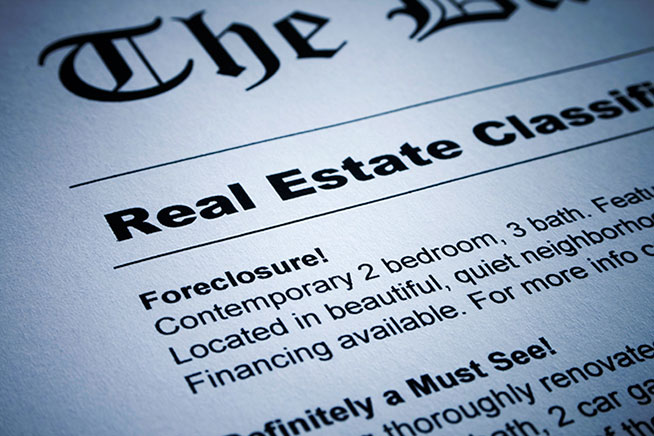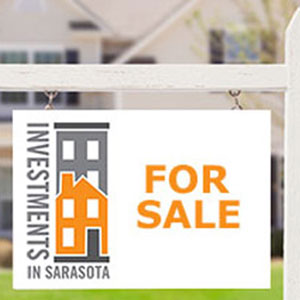One of the saddest and most regrettable results of the bursting of the sub-prime mortgage bubble was the high rate of distressed sales and foreclosures in Florida. The situation that ensued was a sad reality that many people over the last many years were forced to lose their homes.
The climate has changed dramatically as of 2016. However, we would be remiss in our duties as agents and brokers, if we didn’t highlight the investment opportunity presented by these types of sales.
One Man’s Distress Is Another Man’s Opportunity
While the aftermath of the bubble has been highly unpleasant for millions of property owners, it did bring real estate prices down considerably. However, this process also had a pendulum effect with considerable overpricing on the way up and overshooting the bottom on the way down.
If you were a Buyer in the market right before, at the bottom, or shortly thereafter you were the beneficiary of pricing that may have been more reminiscent of the late ’90s rather than 2011-2013.
In 2012, Florida topped the list of states with the highest number of foreclosed homes. Now, in this first half of 2016, Florida is 5th in the US in the number of foreclosures. This is still well above the US average which means there are still some good deals to be found.
Some areas of Florida have had a long road to recovery. These include Hillsborough County in Tampa, and Polk County, which is between the cities of Tampa and Orlando.
In April 2016, about 15% of total sales in Hillsborough County and 16.9% in Polk County were distressed properties.
Otherwise, the number of distressed sales in Florida has decreased significantly. The three biggest contributors to this are:
- an increase of employment: people are employed and earning wages
- growth in wages themselves: workers are earning more today than they did a few years ago
- property values have generally risen and fewer property owners are actually underwater. This means that if someone has to sell, there are many more properties that have equity available to satisfy outstanding mortgages.
In 2016, the discounts that had existed with a distressed sale have also drastically decreased. While a small discount does still exist, the pricing of a property is much more about property condition than if the seller is a bank or a private individual.
However, median prices in Florida are still below their peak. Recovery rates throughout the state vary, differing from city to city or even at opposite ends of the same street. Generally, the decrease in foreclosures and distressed sales is a combination of a property owner’s personal financial situation and the housing market in their neighborhood.
The Grand Opportunity in Rentals
Though it’s another sad reality, an added effect from the increase in people who no longer own their own homes, is that a larger demand for rentals is created. This presents an opportunity for investors looking for a return on investment.
International and Domestic Buyers have purchased a great share of distressed properties over the past several years for the purpose of establishing rental income from those properties.
While the opportunities in this sector are present, and in many instances a great way to achieve value, it is important to understand both the intricacies and the process of foreclosures in Florida if you are going to go this route. It is also critical that you have an excellent Realtor representing you, one who understands fully and completely the tricky nuances of the distressed sale process.
If you are currently looking for a Realtor, we provide a thorough article on what you need to consider in our article Checklist for Choosing a Licensed Realtor in Florida.
Many people seem to think that bank-owned and foreclosed homes are often not included in the MLS listings. This is generally not true, most ARE included, but they may not show up for a while after the lender takes repossession of the home.
There is a convoluted process the bank has to go through before they release a distressed property onto the market. This includes allocating an asset manager to be responsible for the property and stabilizing the property so that its value is maintained. Typically this can take up to a few months before the property is listed on the MLS.
So What is Foreclosure Anyway?
Foreclosure is the legal process whereby a homeowner’s rights to a property are forfeited due to the failure to maintain mortgage payments. If the homeowner is not able to pay off the outstanding debt or sell the house in a short sale, the lender will attempt to recover the balance of the loan by putting the property up for auction. If the property does not sell at auction, it becomes the property of the lender.

The Process of Foreclosures in Florida
Step 1: Missed Payments
The process of foreclosure in Florida begins with the failure of the homeowner to make timely mortgage payments. This may be because of personal economic hardship such as the loss of a job or divorce. Or it may be because the property is “underwater”, meaning that the terms of the mortgage exceed the value of the property, and the homeowner intentionally decides to default.
Step 2: Public Notice
It is typically after three to six months of missed payments that the lender will file a public notice with the County Recorder’s Office stating that the homeowner is in default. In Florida this notice is called a lis pendens which is latin for “suit pending.”
The homeowner will then receive a foreclosure notice from an attorney or law firm representing the lender. This notice is to inform the homeowner that the foreclosure process has begun and that they are in danger of losing their rights to the property and may be facing eviction.
In the state of Florida, the foreclosure process begins the moment the homeowner receives the foreclosure notice.
Step 3: Pre-Foreclosure
Pre-Foreclosure is essentially a grace period during which the homeowner is given time to respond to the foreclosure notice. In Florida, this period is generally within 20 to 45 days of the date that the bank served the notice.
During this time, the homeowner may choose to pay the outstanding balance or arrange to sell the property via short sale. The borrower can prevent the foreclosure by paying in full the amount owed to the lender before the date of the foreclosure sale.
Step 4: Notice of Sale or Auction
If there is no response to the court action within the time specified, then the borrower can be found in default and the foreclosure process will continue. The lender would then ask the court for a final ruling. If this goes in the lender’s favor, the ruling will show the total amount owed to the lender, and the date for the sale of the foreclosed property.
The sale date is usually around 30 days after the court ruling is put in place. The notice of sale is recorded with the County Recorder’s Office and a notification will be sent to the homeowner. The notice will also be published in the local newspaper and the municipal website for a prescribed amount of time, the final notice appearing at least five days before the sale date.
The sale is normally held in the county courthouse and/or online. Because of technology it has become easier to buy in this fashion, yet there are cases where there is little or no due diligence period, so this process is only for the savvy buyer who has a team in place to do fast due diligence prior to the sale.
We have had clients who have clicked “buy now” on a property online and ended up with something which was not what they intended or expected, or worse than that had title issues because there was another lender making claim on the property.
The bidder who wins must put down five percent of the property’s value as a deposit, with the rest due by the end of the day. If this falls through then a new sale is arranged a minimum of 20 days later.
Step 5: Post-Foreclosure
After a successful sale, the winner is given the certificate of sale, and the ownership of the property is transferred within ten days as long as there is no dispute on the sale. The borrower has no way to redeem the property after the certificate of sale is issued.
If the property is not purchased by a third party at the foreclosure auction, the lender then takes ownership and the property becomes a bank-owned property. The bank then may sell the property either by listing it with a local real estate agent on the open market or they may choose to sell it at a liquidation auction. Liquidation auctions are typically held at auction houses or large convention centers.
Timeline to Ownership After Purchasing a Foreclosure in Florida
No one can really predict how long a foreclosure will take as each individual circumstance is different. In 2012, when Florida was the state with the most foreclosures in the country, the process could take 24 to 36 months.
In 2013, as foreclosures continued to clog up the Florida courts with both their numbers and the length of resolution, a new foreclosure law was passed (House Bill 87) and signed by the Governor. This has helped to speed up the process, but, because the process is complex and each situation will vary, it is still nearly impossible to predict just how long any given foreclosure in Florida will take.
All in all, for those who are determined and steadfast, the opportunities for foreclosures in Florida are still available. Misfortunes happen even in the best of times. And those willing to persevere can often find a great property at a reduced price. Whether you decide to pursue a distressed property or a standard listing, we always recommend that you have a well-equipped agent on board to help you navigate the waters in search of your new Florida Home.
Schedule a free 20 minute Sarasota real estate orientation video conference by choosing a date in the sidebar.


